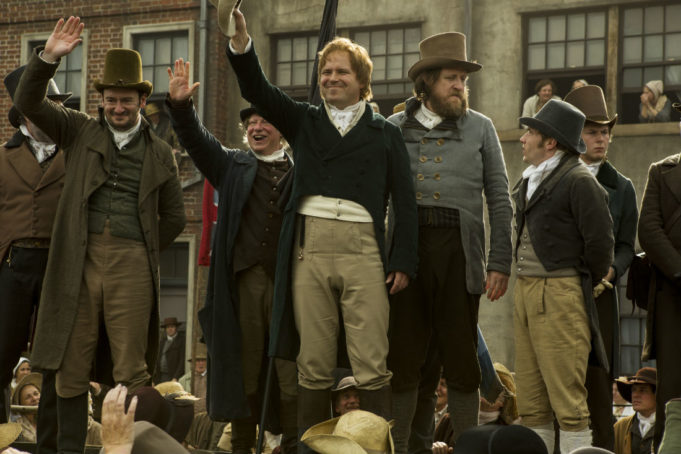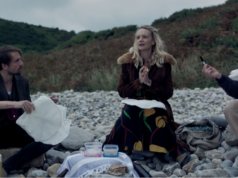On the rare occasions that a Mike Leigh film arrives in our multiplexes, it’s worth taking notice of. His latest, Peterloo, plays at AMC Grapevine Mills starting this weekend, and it’s unlike any of the British director’s other movies, a massive epic with thousands of extras and scenes in manors that might have come out of a Jane Austen film. This doesn’t always play to Leigh’s strengths as a filmmaker, but a 153-minute period piece about a historical event that’s obscure to most Americans needs all the help it can get, so I’m here to help.
If you’re looking at this historical period with fresh eyes, it will seem frightfully familiar to you. In 1819, the British people had expected a return to prosperity with the end of the Napoleonic Wars, but that did not happen for the rural populations. With a day’s wage no longer sufficient to support a family, the people started listening to activists with radical democratic ideas such as holding elections to vote for members of the House of Commons. On Monday, August 16 of that year, a crowd of 60,000 people assembled in St. Peter’s Field in Manchester to listen to Henry Hunt, a wealthy London landowner who nevertheless railed against the privilege of his class, speak in favor of enfranchisement. The city fathers, desperate to keep order, had a detachment of soldiers charge the peaceful, unarmed crowd (many of them women and children, unusual for that time) with swords drawn to arrest Hunt and the other speakers. Fifteen people were known to be killed, including a mother and her 2-year-old boy trampled by a soldier on horseback, while hundreds of others were stabbed, beaten, and crushed. Coming so soon after the British Army’s victory at Waterloo, the massacre at St. Peter’s Field was derisively dubbed “Peterloo” by journalists from London, Leeds, and Liverpool who witnessed it and reported it despite being jailed for doing so.
The film adopts the viewpoint of Hunt (Rory Kinnear) and Nellie (Maxine Peake), a baker who welcomes her traumatized teenage son (David Moorst) back from the war, where he served as a bugler. Hunt may be on the side of the angels, but he acts like a diva when he arrives in Manchester, treating the locals with occasional kindness but far more often with grudging tolerance and condescension. He abruptly disappears from the film following his arrest, which is a bizarre decision. (The real Henry Hunt lost his fortune as a result of his imprisonment, but promptly moved back into business and politics after his release. He presented the first-ever women’s suffrage bill to Parliament, and was widely laughed at for his trouble.)
Leigh has successfully executed big, panoramic canvases before from the viewpoints of one or two characters in Mr. Turner and Topsy-Turvy, but here the scale gets away from him. In its zeal to depict the numerous facets of the reform movement and the methods the government used to infiltrate it, the story feels decentered. The town magistrates who order the killings are a bunch of cardboard villains, watching the carnage while sipping their claret. For once, Leigh doesn’t give us enough context. The re-creation of the massacre takes up the last half-hour of the film, but without knowing what role the massacre played in the larger story of British history, it plays like Paul Greengrass’ less effective historical thrillers. Maybe it necessarily means more to British viewers, who know that the reformers eventually won most of their objectives within 20 years of the battle. Nevertheless, we Americans are left with a fat Prince Regent (Tim McInnerny) in his palace simpering about the guillotine while having his mistress (Marion Bailey) spoon-feed him like a baby.
Still, the movie does show how power perpetuates itself even in the face of such a shameful event, as that prince sweepingly clears the magistrates and the soldiers of all wrongdoing, praising them for keeping the public order. The epic quality allows his actors to draw some finely etched portraits, too, like Neil Bell as the aggrieved local reformer who invites Hunt to Manchester and later regrets it, Victor McGuire as a thuggish chief constable, Johnny Byrom as a reformer who speaks in apocalyptically violent terms and allows his colleagues to be caricatured as believing the same. Kinnear (you’ve seen as an MI6 factotum in the recent James Bond films) fills the role of Henry Hunt with an orator’s charisma as well as the air of a man who expects to be lauded as a savior wherever he goes. Peterloo is significant, especially in light of the filmmaker behind it. Still, it leaves me yearning for Leigh to return to something luminous and small like Career Girls and Happy-Go-Lucky and Another Year. I don’t know if those movies are his best, but it’s the movies of his that I like best.
Starring Rory Kinnear and Maxine Peake. Written and directed by Mike Leigh. Rated PG-13.












